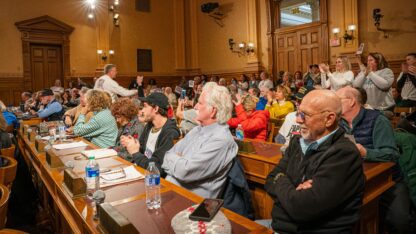Before there was YouTube, there was Public Access TV. It put cameras in the hands of anyone who had the time and creativity to put on a show. Average (or not so average) Americans produced content that reflected their worlds and their imaginations. In the case of “The American Music Show,” that world was Atlanta’s underground music and drag scene.
The groundbreaking public access show ran from 1981 through 2005 and helped launch the television career of Emmy Award-winner RuPaul.
Co-producer Dick Richards once said that the American Music Show attempted to “hold open this tiny window to let weird and interesting things into the lives of the people who choose to tune in.” That tiny window is opened a little wider thanks to Emory University’s Rose Library, which holds the American Music Show’s extensive video archives.
“I would describe [the show] as organized chaos,” Andrew Kingston tells “City Lights” producer Myke Johns. Kingston is the Emory Woodfruff Fellow and has been working to digitize the almost 750 VHS tapes that comprise the archive. “[There were] people talking over one another, lots of music, some sketch comedy, remote reports from around the city, people in drag. Much of it was unscripted. Just kind of a wild public access show.”
In a recent article, Kingston wrote of the show as existing “in a particularly queer idiom, making video art for an LGBTQ+ Atlanta at the same time as the gay communities in Midtown and Virginia Highlands were establishing themselves.”









